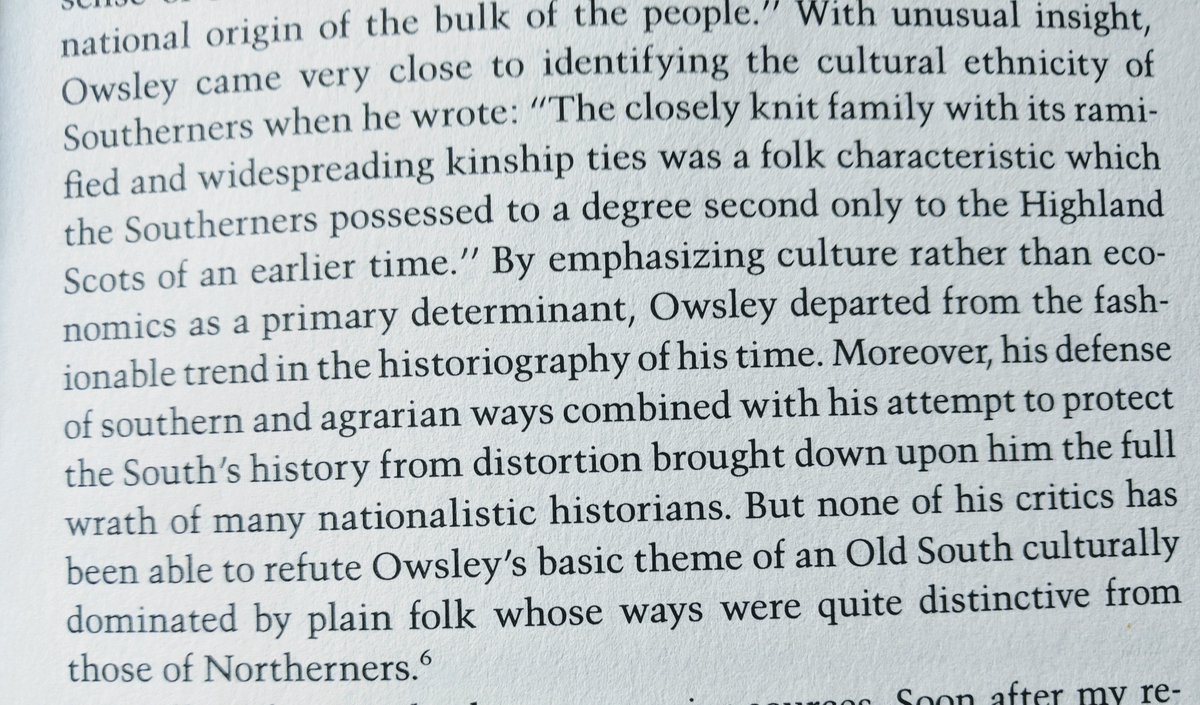Thread as promised on the Solid White (#Confederate) South thesis, including the "herding thesis," culture of honor, "Cracker culture" tropes, & why overturning these rids us (false) history written by white supremacists.
1. In the years following the Civil War, all the way to the post-Depression era, historians-both racists like U.B. Phillips, as well as anti-racists like WEB DuBois & William M. Brewer (the editor of the Journal of Negro History for nearly two decades)-described the white South
2. as deeply divided bw wealthy slaveholders & poor whites. There were middling-class yeomen, as well, but their focus was on the tensions bw the haves & the "helots." But by the 1920&30s rich white Southerners were frightened by a rapidly industrializing, urbanizing country- &
3. the changes in the racial caste system. The "Southern Agrarians," including historian Frank Owsley, began vigorously defending & romanticizing the South, completely ignoring slavery & reviving the #LostCause narrative.
Why is this important?
Well...
Why is this important?
Well...
4. Owsley's fraudulent, racist history would come to dominate the way historians, economists, & even the public conceptualized the white South - even to this day.
Attempting to prove that slavery had had almost no effect on non-slaveholding whites, Owsley erroneously held that
Attempting to prove that slavery had had almost no effect on non-slaveholding whites, Owsley erroneously held that
5. the vast majority of white southerners owned land. Just as slaveholders downplayed & hid the poverty of poor whites under slavery, Owsley did the same writing history in 1949. If all whites were "lifted up" by slavery, then it could be considered a "benign" institution that
6. did the white South a lot of good. Without revealing methodology, he claimed that 80-85% of antebellum white Southerners owned land, & the ones who didn't HAD NO DESIRE TO OWN LAND. Instead, they preferred "freedom" & wanted to roam, herding hogs & other livestock. 

7. This "herding thesis," apparently still used by prominent economists, was nothing more than a deflection of fraudulent quantitative work & a desire to minimize the deleterious effects of slavery. Owsley claimed that any white could become a master; that slavery
8. created a land of opportunity & social mobility for whites.
See, Owsley wanted to discredit neo-abolitionist historians who had emphasized the hegemony of the Old South’s planter class & the resulting degradation of both Blacks & poor whites. Evidence of his racism abounds:
See, Owsley wanted to discredit neo-abolitionist historians who had emphasized the hegemony of the Old South’s planter class & the resulting degradation of both Blacks & poor whites. Evidence of his racism abounds:

9. Owsley (& his students') work was subsequently overturned by serious scholars, yet his false history of the herding, "Solid South" still remains the accepted narrative.
Outside of frontier areas, Southerners were overwhelmingly agricultural workers.
Outside of frontier areas, Southerners were overwhelmingly agricultural workers.

10. Owsley’s contentions were almost immediately repudiated in a Journal of Negro History article that appeared in 1946. Along with two other Confederate sympathizers, Owsley was taken to task by a young Harvard-trained economist named Fabian Linden: 

11. Yet despite Linden’s work, and other recent efforts by a handful of scholars, the larger narrative of southern history is not yet liberated from Owsley’s myths. Historians have managed to free much of southern history from the distortions of Confederate apologists, but
12. not Owsley's distortion of the antebellum/Civil War eras. His contentions, specifically the herding thesis, have been taken up by other "historians" like Grady McWhiney, the mastermind of the disturbing "Celtic thesis." Like Owsley, he attributed the cause of CW to "culture"- 

13. NOT slavery. Southerners, he claimed, were Scotch-Irish & (non-Catholic) Celts who loved a good time & didn't want to work, unlike the Puritanical, $-obsessed "English" Northerners. Slavery, they insisted, had nothing to do with secession; it made life good for all whites. 

14. Owsley's work even morphed into accepted cannon on white Southerners being more violent supposedly due 2 ethnic differences from Northerners, giving rise to a pronounced culture of honor. So instead of living in a hell-hole police state marred by constant BRUTALITY & VIOLENCE
15. these historians - all white Southern men - blamed the violent nature of the South on CULTURE. Not economics, not SLAVERY.
(Nell Irvin Painter was right!)
(Nell Irvin Painter was right!)

16. This false narrative of white unity over slavery & the Civil War has persisted, despite excellent histories by scholars like Timothy Lockley, Jeff Forret, & Charles Bolton - and... 

17. the amazing @vikki_bynum, who literally wrote the book on the Free State of Jones. (I also love Unruly Women, and this one:) 

18. And a reminder: this is not to say that whites who didn't support the Confederacy (or even slavery) were not racist. I assume all whites in 19th c *were*. They benefited from white supremacy. But it is incredibly important to point out the class conflict & rifts bw them.
19. Thus, until we take Southern history back from the grips of white supremacists like Frank Owsley, the true impact of slavery & racism - economically, socially, politically, & psychologically - will never be known.
20. (END) Dismantling histories specifically written to uphold the lies of the #LostCause, romanticizing the #Confederacy & completely ignoring slavery - must be the task of today's historians...
A true reckoning of our nation's long & brutal history of racism depends upon it.
A true reckoning of our nation's long & brutal history of racism depends upon it.
.@Stephen_A_West you get a shout-out here!
Sorry - this should say 1940s and 50s (his main book was published in 49).
• • •
Missing some Tweet in this thread? You can try to
force a refresh










